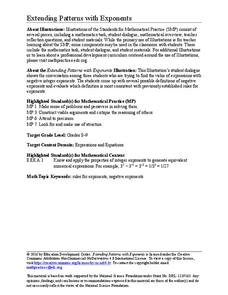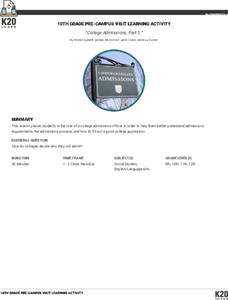Common Sense Media
My Online Code
Approach ethical online behavior with a series of activities geared toward teaching pupils about digital citizenship. After a brief discussion about ethics, small groups inspect a fictional social networking profile with ethics in mind....
Baylor College
Lungometer
Life science learners construct lung-o-meters from gallon-sized milk jugs and then measure their lung capacities. For older young scholars, have them graph the vital lung capacities of each person in the class. Cross-curricular pieces...
All for KIDZ
Building Relationships: The Orphan of Ellis Island
Family and friendship are two very important themes of the historical fiction novel The Orphan of Ellis Island by Elvira Woodruff. From video clips and writing prompts to reader's theater and family interviews, this resource provides...
TCI
Picking Rusty Gold: Why Do People Buy and Sell Antiques?
Your historical sleuths will work to research the in-depth history of chosen artifacts and will use their research to design a fictional advertisement for an early 20th century item.
Curated OER
Groupworld: A Group Imagination Activity to Promote Group Cooperation and Compromise
Teach learners how to communicate and collaborate in a discussion on a shared project with this rich activity. It asks participants to channel their unique imaginations to produce a fictional "groupworld", while adhering to proper...
Alabama Wildlife Federation
Wildlife Habitat Checklist
Take a walk on the wild side with a project about animal habitats. After kids observe a chosen animal in its home, they describe the animal's food and water sources, shelter, and how it raises its young. They then write a short fictional...
DeKalb County Schools
Compare/Contrast
A series of reading activities is sure to engage your young readers! Based on comparing and contrasting ideas, the packet provides opportunities to compare characters, themes, texts, and other elements of fiction.
EngageNY
Grade 9 ELA Module 1, Unit 1, Lesson 5
Finding the central idea in a text is equally important in fiction and nonfiction. Work on analyzing a piece of writing for the central idea with Karen Russell's "St. Lucy's Home for Girls Raised by Wolves," complete with supporting...
Science NetLinks
Green Roof Design
Green roofs aren't just eco-friendly — they are literally green with trees. Groups learn about the concept of green roofs in order to be able to design one. The groups design a 5,000-square-foot green roof for a fictional apartment row...
Education Development Center
Finding Triangle Vertices
Where in the world (or at least in the coordinate plane) is the third vertex? Given two coordinate points for the vertices of a triangle, individuals find the location of the third vertex. They read an account of fictional...
Education Development Center
Proof with Parallelogram Vertices
Geometric figures are perfect to use for proofs. Scholars prove conjectures about whether given points lie on a triangle and about midpoints. They use a provided dialogue among fictional learners to frame their responses.
Education Development Center
Rational Exponents
It's rational to root for your class to learn about exponents. Scholars study rational exponents by reading a fictional dialogue between classmates. They analyze the conversation to understand the connection between rational exponents...
Education Development Center
Extending Patterns with Exponents
Don't think negatively about exponents. Young mathematicians dissect a fictional conversation between pupils trying to evaluate an expression with a negative exponent. This allows them to understand the meaning of negative exponents.
Advocates for Human Rights
The Rights of Migrants in the United States Lesson Plan: Traveling Suitcases
Two activities bridge English language arts and social studies to take an inside look into immigration. Scholars interview a family member or someone they know who immigrated here. A crafted suitcase features information obtained in the...
PBS
Extranjeros and Expansion
A three-part lesson gives light to the Unites States expansion from the view of Texans, New Mexicans, and Californians. Through videos and written activities, scholars work collaboratively to research specific individuals and their...
PBS
The Power of Personal Narrative
Personal narratives are powerful things. Whether told from the first-person or third-person point of view, whether in the form of an essay, a short story, novel, or video, whether fiction or fact, they capture readers and give them...
EngageNY
Analyzing How Shakespeare’s Play Draws upon Greek Mythology: Part 3
How do the narrative and play versions of the myth "Pyramus and Thisbe" affect meaning? Scholars reread Act 5, Scene 1 from Shakespeare's A Midsummer Night's Dream and compare its structure to "Pyramus and Thisbe." Next, they use a...
National Woman's History Museum
Pocahontas: The Truth vs. The Legend
Young historians study primary and secondary source materials to try and separate the true story of Pocahontas from the myths, fictional tales, and conflicting accounts of her life.
K20 LEARN
College Admissions, Part 1: 10th Grade Pre-Campus Visit Learning Activity
Scholars assume the role of admissions officers to better understand the college admissions process. They evaluate five fictional college applications and work together to determine which ones meet acceptance requirements.
Teaching Tolerance
Media Consumers and Creators, What Are Your Rights and Responsibilities?
Teach the class to separate fact from fiction. Scholars explore the topic of fake news as they read PEN America's News Consumers' Bill of Rights and discuss the rights and responsibilities outlined in the bill. Next, they read an article...
Nemours KidsHealth
Healthy Relationships: Grades 9-12
After reading a series of informative articles about healthy and abusive relationships, class members demonstrate what they have learned as they take on the role of RESPECT hotline counselors and offer advice to fictional victims of...
Health Smart Virginia
Face of Mental Illness
There are a lot of myths and misinformation out there about mental illness. Help set the record straight with a resource that debunks the falsehoods and provides high schoolers with accurate and important information about the various...
Nemours KidsHealth
STDs: Grades 9-12
After gathering information about Sexually Transmitted Diseases (STDs), high schoolers engage in two activities designed to educate themselves and others. They begin by using what they have learned to write a speech for a friend who...
Health Smart Virginia
"SuperBetter" Stress Management
The goal of this Health Smart lesson is for freshmen to develop a personal system for coping with stress. They create a power-up list of things that make them feel happier, healthier, or better connected, identify people in their lives...
Other popular searches
- Non Fiction
- Historical Fiction
- Science Fiction
- Non Fiction Text Features
- Realistic Fiction
- Fiction and Nonfiction
- Elements of Fiction
- Fiction or Nonfiction
- Non Fiction
- Fictional Narrative
- Non Fiction Writing
- Teaching Historical Fiction

























